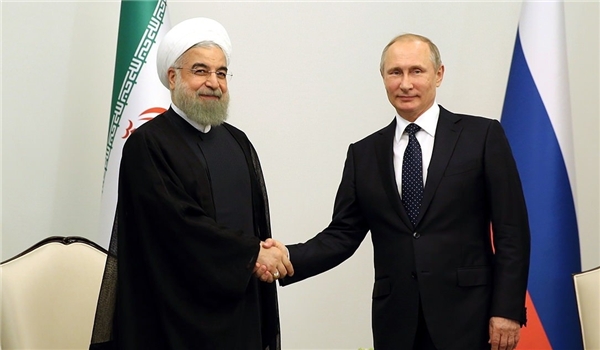
RNA - The Israeli leaders have not hidden Tel Aviv's happiness with the way the things developed in Syria during the six years of crisis and the resultant massive devastation and the comprehensive attrition of warring sides as they called this era the “golden time” for the Israeli regime due to decline of the Arab armies and the Arab and Islamic countries' obsession and involvement in the big battle whose ferocity appeals to the enemies of the regional nations. However, things have begun to over the course of nearly past two years, bringing about a set of significant developments on the Syrian war stage that cause the Israeli regime to grow strategic concerns. The Israeli leaders know that once these developments continue, Tel Aviv's bets and hopes will go unachieved.
The developments majorly started since almost two years ago after the gains made by the Syrian government’s forces and their allies on the ground of fight against an array of their opponents. The triumphs have been significantly made under the Russian air cover and the Iranian ground support. The liberation of the northern city of Aleppo from al-Nusra Front's terrorists last year marked a climactic juncture in the Syrian army’s anti-terror serial breakthroughs.
Once joyfully watching the resistant Syria suffer from the heavily destructive war, the Israeli regime now, due to the recent developments, has the conviction that the course of battle goes just contrary to its expectations, leaving no room to Tel Aviv to see its goals materialized. New reality now has set to develop in Syria, posing threats to the Israeli regime: the staunchest opponent of Tel Aviv, Iran, is right in the command of the new Syria reality that sends the Israelis into the spin.
The deep fear of the new Syrian situation has driven the Israeli Prime Minister Benjamin Netanyahu to seek help from the top global powers.
First side to which Netanyahu expresses concerns is the US, where the new government of President Donald Trump has begun to pursue tougher policies to deter the growing Iranian influence across the region, including in the Israeli regime’s neighbors, on top of them Syria. Tel Aviv is pressing the new American administration to forsake the former president Barack Obama's policy of indirect involvement in the situation and embark on a direct interventionist strategy. Perhaps the recent deployment of big number of the US Marines to Syria and Washington's announcement of plans to send more to Iraq and the whole region signals strongly that the US is returning to the direct intervention policy.
In this relation, Washington and Tel Aviv recently engaged in a process of mutual contacts on various levels. The news reports that follow these communications and visits that follow and precede them unanimously confirm that an essential part of the contacts are devoted to discussing the ways to confront Iran's regional sway. This was witnessed when Netanyahu and Trump met in mid-February, not to mention the discussions that came before and after this meeting.
Russia is another international destination and power to which Netanyahu reaches out in order to take Tel Aviv’s Iran-related concerns away. The Israelis put premium on the ties with Russians, not less than the ties with the allied Americans. This drive has taken the Israeli PM to meet the Russian President Vladimir Putin several times this year.
The Israeli leaders' intensified contacts with the Russian counterparts in recent past come with two marked ends: first, taking advantage of the enlarging Russian role in West Asia. Tel Aviv seeks guiding the increasing Moscow role, or even manipulating it, if possible, towards the Israeli interests in the region. The second push is the Israeli concerns about close Iranian-Russian relation which in long run will work against the Israeli interests. So the more interconnected the Moscow-Tehran interests grow, the more grows Tel Aviv’s worry about its future that could be endangered by this Iran-Russia interrelation of interests.
This incentivizes the Israelis to press for boost of relations with Moscow through persistent contacts all to get Russia away from Iran in hope of shifting their mutual interests to confrontation.
The Israeli PM Netanyahu has repeatedly expressed the Israeli fears of the Iranian role in Syria. He, for instance, while flying home after meeting with the Russian president on March 9, said during a press gathering that Iran was pushing a deal to build a naval base in Syria to solidify military presence in Syria. Netanyahu added that this will pose threats and major consequences to the Israeli security.
Netanyahu also underscored the aim behind his Moscow visit, saying that he went there to talk the Iranian influence in Syria with the Russians.
“This (Iranian influence) was top on agenda of my talks with Russian president. I emphasized that this is in conflict with the common Israeli-Russian interests, and will preclude any future settlement for Syria conflict,” said Netanyahu.
But it does not seem the Israelis up to now made any success in persuading the Russians in favor of capping the Iranian Syria influence to build their agenda to deal with the new Syria reality including carrying out airstrikes that target sites in the Syrian territories every now and then. The form of upcoming US-Russia ties, the analysts argue, will largely affect the Israeli desires in the region generally and in Syria specifically, however.
According to Alwaght News and analyses website, the Israeli concerns are expected to double as now it is surrounded by the Iranian-backed Lebanese resistant forces in north and the Palestinian groups in south, not to mention recently-emerged Harakat Hezbollah al-Nujaba movement in Iraq, a popular force formed in opposition to ISIS terrorist group, announced establishing a brigade to liberate Syria’s Golan Heights from the Israeli occupation.
847/940